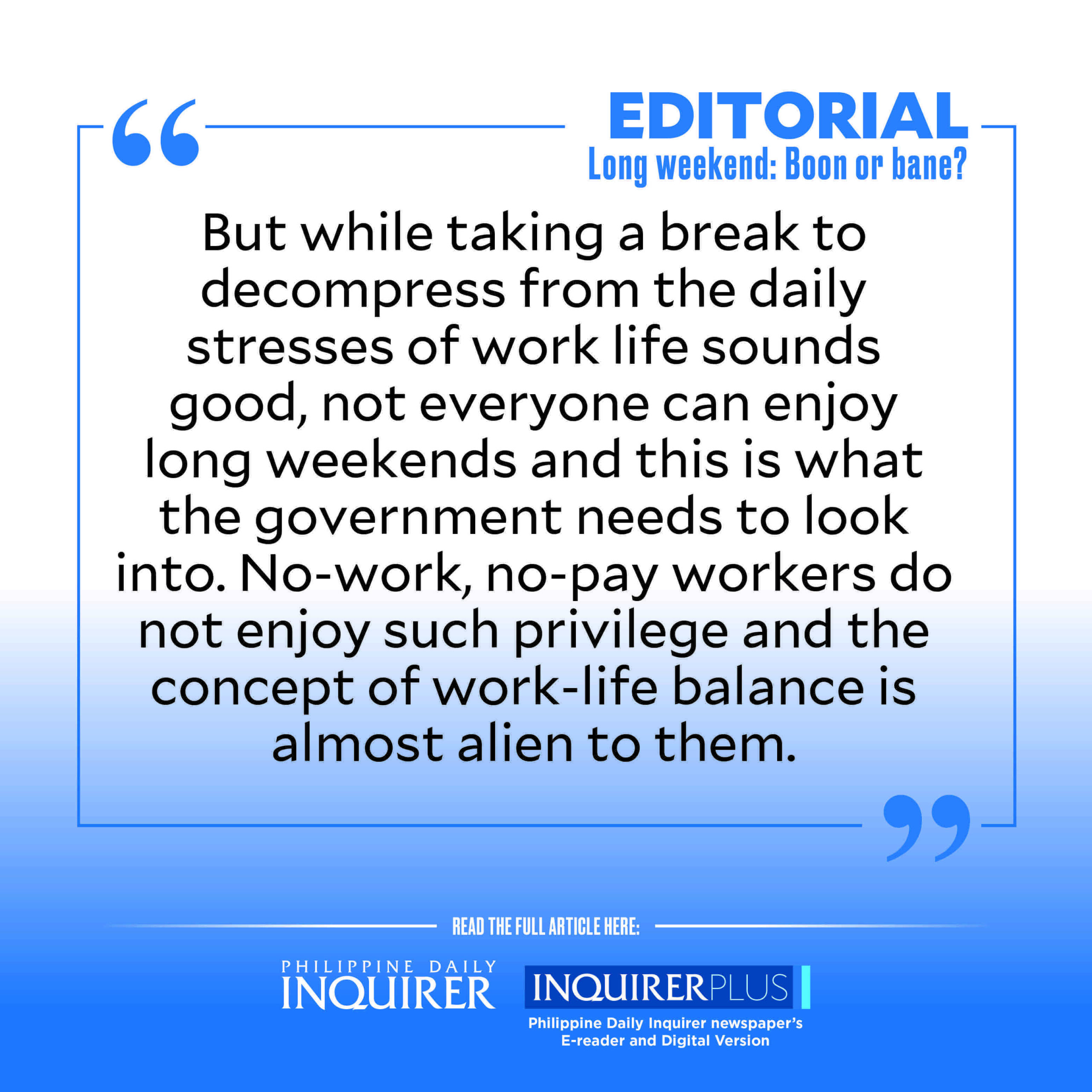Long weekend: Boon or bane?

Who doesn’t love long weekends? President Marcos’ long weekend policy has recently gained traction in the business community with two of the biggest groups voicing support for it.
This is quite a change in perspective from last year’s reservations over the “oversupply” of national holidays, with businessmen pointing out that they incur higher labor costs because of the nature of many businesses whose operations must continue during holidays. Employers have to pay workers 200 percent of the daily wage and an additional 30 percent of their hourly rate for overtime work on regular holidays, and 30 percent of the daily wage on special nonworking holidays. Even the trade secretary said he wanted to limit the annual holidays to 10, as observed by international organizations.
What a difference a year makes. The other week, the Philippine Chamber of Commerce and Industry (PCCI) and the Federation of Philippine Industries (FPI) backed Mr. Marcos’ policy acknowledging that long weekends could spur domestic travel and consumption, and this would be a huge help, especially to local enterprises that are still recovering from pandemic slump. PCCI president Enunina Mangio said the increased spending could trickle down to the grassroots and “[add] value to other sectors including retail, food, and service.” FPI chair Jesus Arranza said compressing rest days would be conducive for people to spend money, which could mean additional income for those working in the previously mentioned sectors.
Article continues after this advertisementHoliday economics
Albay Rep. Joey Salceda, chair of the House ways and means committee, had cited an analysis by the Philippine Statistics Authority that longer holiday weekends boost domestic tourism by 10 percent. Data showed subsequent increases in the following areas: 4.9 percent in personal consumption, 3.5 percent in final demand and total consumption, 8.8 percent in gross value-added for trade, 5.5 percent in GVA for food manufacturing, 5.4 percent in GVA for transport, 4.4 percent in recreational activities GVA, and 5.9 percent in hospitality GVA.
Since he assumed office in 2022, Mr. Marcos has promoted holiday economics, a policy first introduced under the Arroyo administration in 2001. The President said long weekends could “help encourage domestic travel and increase tourism expenditures.” There were 20 declared holidays last year; this year, there are 18 under Proclamation No. 368 which was issued as early as October last year, purportedly to give the public time to plan their holidays ahead. PCCI, however, said the government should no longer increase the number of total holidays beyond the current number as this would impact labor costs for manufacturing and business process outsourcing industries and affect their competitiveness.
Five long weekends
In case you missed the memo, here are this year’s regular holidays: Jan. 1 (New Year’s Day), March 28 (Maundy Thursday), March 29 (Good Friday), April 9 (Araw ng Kagitingan), May 1 (Labor Day), June 12 (Independence Day), Aug. 26 (National Heroes Day that falls on the last Monday of August), Nov. 30 (Bonifacio Day), Dec. 25 (Christmas Day), and Dec. 30 (Rizal Day). The special nonworking days are: Feb. 9 (Chinese New Year), March 30 (Black Saturday), Aug. 21 (Ninoy Aquino Day), Nov. 1 (All Saints’ Day), Nov. 2 (All Souls’ Day), Dec. 8 (Feast of the Immaculate Conception of Mary), Dec. 24 (Christmas Eve), and Dec. 31 (New Year’s Eve). Out of these holidays, five long weekends are happening in February, March during Holy Week, August, November, and December.
Article continues after this advertisementMr. Marcos posted a reminder on Instagram earlier this month urging the public to take advantage of the long weekends in 2024 together with their families and loved ones. “We should plan well our work and vacation for a productive and bountiful year,” he said.
No-work, no-pay
But while taking a break to decompress from the daily stresses of work life sounds good, not everyone can enjoy long weekends and this is what the government needs to look into. No-work, no-pay workers, as previously pointed out by Gabriela party list Rep. Arlene D. Brosas, do not enjoy such privilege and the concept of work-life balance is almost alien to them. These workers, mostly from the construction and delivery sectors, constitute 60 percent of the labor force. For them, having a job is a vacation from poverty; if they do not work, they do not get paid, and for many of them, their families do not get to eat either. While it may be argued that the increase in economic activities could result in additional work for many, there has to be a mechanism that protects daily wage earners from abuses and ensures that opportunities are accessible to them.
Human development is an important component of economic growth but this does not mean only taking care of the work-life balance needs of the working class or the bottom line of businesses, but also looking after the welfare of the ordinary workers. In pushing the country forward, the government must work to uplift lives and promote the well-being of all.
















